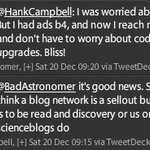
Blogging has been around since the late 1990s and email (effectively) for a decade prior to that - both are now on the wane, according to recent claims (email by social media and blogging by...social media again) and while it's true I wouldn't start a standalone email company today, having it as part of a suite seems like a good idea. Since practically the day we began we have had @science20.com email addresses available to columnists and featured authors but one more email address is not really helping most people.
I was an early adopter of email, though it was more of a novelty.…



